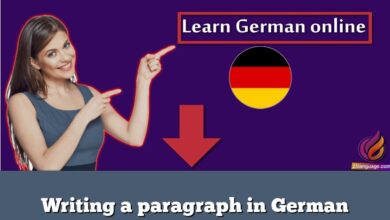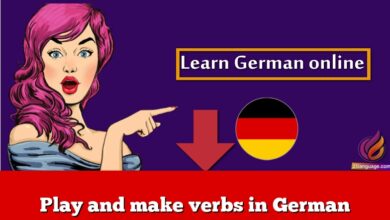Modal Particles in German
What are Modal Particles in German?

Modal Particles in German are an interesting feature of spoken language. We use them in order to mold or adapt something we say to a specific situation or person (situational context).
In this sense, modal particles don’t add essential information. This is the reason why it is difficult and even unnecessary to translate them.
In this article I’m going to explain 3 of the most used modal particles in German.
1. denn
This modal particle mustn’t be confused with the causal conjunction denn that always has a comma before itself. The modal particle denn is only used in questions, it’s never stressed and has the following functions:
- When using denn, it seems you are adding more interest to the question.
- At the same time, it can “round down” the question, meaning the question doesn’t sound so straight forward.
Examples:
- Was machst du denn? (You really want to know what or why the other person is doing that.)
- Hat sie denn angerufen? (You are not sure, you are doubting whether this person has called or not.)
- Wie kann ich Ihnen denn helfen? (Asking someone you don’t know in a kinder way.)
2. doch mal
Here we have the combination of 2 modal particles that often go together. We usually use them in imperatives. They help the imperative sound less harsh. Examples:
- Komm doch mal vorbei, wenn du Lust hast. (Invitation)
- Helft mir doch gerade (= in this very moment) mal die Sachen hoch(zu)tragen. (Request)
- However, with certain verbs, doch mal means you are annoyed: Hör doch mal (besser) zu! Pass doch (mal) auf! (You can tell the difference easily because of (1) the intonation – this one actually sounds harsh – and (2) the imperative stands alone.)
3. ja
This interesting modal particle has absolutely nothing to do with the affirmation adverb ja that normally has a comma after itself or can stand alone (Ja, ich mach das.)
No, this particle expresses that the people taking part in this conversation know what the speaker is talking about. It is never stressed! This may be a specific information only the participants know about or general information known by everyone (such as “a day has 24 hours”).
Learn German | German Grammar | Modalpartikeln | B1 | B2
This ja can be understood as “as you (already) know”. Examples:
- Ich hab das ja gestern schon gemacht. (“As you know, I did it yesterday already.”)
- Das Buch ist ja noch nicht da. (“As you know, the book hasn’t arrived yet.”)
- Darüber haben wir ja schon gesprochen! (“We already talked about that, remember?!”)
It can also express that something has happened exactly as you expected:
- Das musste ja passieren. (This had to happen (like this)!)
On the contrary, it can express surprise, astonishment:
- Das war ja einfach! (How easy this was!)
German Modal Particles
Looking for a faster reado on this topic? Check out our article on German Interjections here. “Modalpartikeln”, or “modal particles” are filler words that add a nuance, or “color” to a German sentence. By using a modal particle, the speaker can convey his or her attitude, a feeling, or a certain assumption about a specific topic to what is being said. They are typically used within an informal context, and would not be found in official letters or documents, newspaper articles or a scientific article or book. Because they only add a nuance to a sentence, and do not change the meaning or the context, they can always be omitted, especially when one is still not quite sure how to use them.

Usage
When trying to insert the literal translation of each word into the translated sentence, it becomes clear that it cannot be used when using the it as a modal particle. We cannot say “Today is yes Tuesday!”, or “Get times up!”.Here are examples of the same words used in sentences that do not use them as a modal particle. The words here are not used to convey a certain feeling or attitude. Hence, the direct translations can be used:
-
Sie kommt heute nicht mit, denn sie hat kein Geld.
She will not come along today, because she has no money.
-
Ich habe den Arzt drei mal angerufen.
I called the doctor three times.
- Das letzte Spiel haben sie verloren, doch Meister wurden sie trotzdem. They lost the last game, but they won the Championship anyway.
-
Ja, ich habe Geld, aber Zeit habe ich nicht.
Yes, I have money, but time I do not have.
- Halt! Bleiben Sie stehen! Stop! Don’t move!
-
Der Fussboden ist eben.
The floor is even. - Wir haben eigentlich drei Abteilungen! We actually have three departments!



























